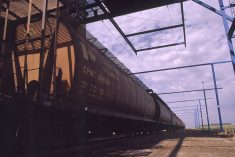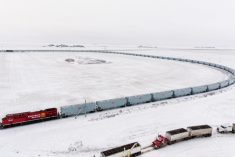Canada’s largest railway has taken the unusual step of apologizing for its pace of grain delivery in recent weeks and pledging “immediate steps” to improve its grain handle.
After parting ways with its CEO Luc Jobin on Monday, Canadian National Railway (CN), through interim CEO Jean-Jacques Ruest, said Wednesday it “apologize(s) for not meeting the expectations of our grain customers, nor our own high standards.”
CN on Wednesday said it will now deploy “qualified management employees” to operate extra trains; add train crews in Western Canada; and offer incentives for “key operating employees” to delay retirement and put off vacations as well as for “recently-retired” operating employees to return to work.
Read Also

Senft to step down as CEO of Seeds Canada
Barry Senft, the founding CEO of the five-year-old Seeds Canada organization is stepping down as of January 2026.
The added train crews, CN said, include about 250 conductors added in the last three months of 2017, about 400 more in the first three months of this year and another 375 to be added between April and June.
The company said it has also leased 130 more locomotives, “almost all of which are now online.”
CN said it delivered 4,577 empty hopper cars last week, up 35 per cent from the February average of 3,400. “All available hopper cars are in service and we will show sequential weekly improvements progressing towards 5,000 per week by the end of March,” the company said.
“We will provide regular weekly tracking on our grain movements and engage our grain customers,” Ruest said.
CN’s pledge follows a letter Tuesday to Ruest and Canadian Pacific Railway (CP) CEO Keith Creel from federal Agriculture Minister Lawrence MacAulay and Transport Minister Marc Garneau, citing concerns from shippers in a “variety of sectors” over rail service.
In recent weeks, the ministers wrote, concerns have risen among grain growers and shippers over “the lack of rail cars, the slow turnaround time of trains, and the reduced pace of rail movements from grain elevators to ports.
“We understand that there have been challenges for the railways this year, including a larger than expected grain crop and adverse weather conditions, but it is imperative that everything be done to ensure the efficient movement of grain and other commodities.”
For its part, CP on Wednesday blamed “extreme weather” over the supply chain through much of February, contending the “chain works best when all of the players are functioning at a high level.
“When one railroad struggles, or a shipper is dealing with a labour outage, or a vessel captain refuses to load in Vancouver due to rain — the entire supply chain suffers, just as it does when temperatures drop below -25 C for long periods of time.”
“While our challenges have been significant, they are different than that of our competitor’s and the success of the supply chain depends on both railroads running at optimum levels,” Creel said in a release.
Meanwhile, CP said it saw its grain shipments in week 31 up by 16 per cent and spotted “nearly 50 per cent more empties to the country,” both compared to the previous week.
CP noted this year’s crop had been originally forecast at around 65 million tonnes, but will end up closer to 71 million metric tonnes, with much of the increased production seen in the railway’s northern catchment area while the south was relatively dry.
“These short-term challenges are episodic, not systemic and we expect our network to improve with improving weather conditions,” Creel said.
‘Cash flow problems’
Groups including the Canadian Federation of Agriculture and Grain Growers of Canada on Wednesday renewed calls for passage of federal Bill C-49, the Transportation Modernization Act.
Both CN and CP also called Wednesday for the bill’s passage; the bill, CP said, will “bring some further certainty to the grain supply chain moving forward, specifically relating to new hopper car investment.”
C-49, which Garneau introduced in the Commons last May, imposes data-reporting requirements on railways, sets up rules for long-haul interswitching between railways and allows shippers to seek “reciprocal” financial penalties in their service agreements with railways.
The bill passed third reading in the Commons in November and has been parked at second reading in the Senate since December, when it was referred to the Senate standing committee on transport.
Not all farm groups are on board with C-49 as a solution to grain shipping woes; the National Farmers Union on Tuesday said the legislation “weakens the railways’ common carrier obligations to the point it may become almost impossible to find that a railway is providing insufficient service.”
The CFA on Wednesday also called on Ottawa to quickly provide cash-strapped farmers awaiting payment for grain with “short-term income supports” — for example, expanding the provisions of the federal Advance Payments Program (APP).
MacAulay, in a separate release Friday from Farm Credit Canada, said he “encourage(s) all affected producers to consider applying” for APP cash advances. The APP offers federally-guaranteed advances of up to $400,000, the first $100,000 interest-free.
Farm Credit Canada on Wednesday said it is “offering support to customers across Western Canada facing potential cash flow problems due to delays in grain movement to international markets.”
FCC said it would work with affected Prairie grain growers to “explore options to address their individual needs,” noting it offered similar supports in 2014.
Canada’s rail service situation “is not as dire as it was in 2013-14,” MacAulay and Garneau said in their letter Tuesday to the railway CEOs, but “railway performance has been disappointing.” — AGCanada.com Network




















